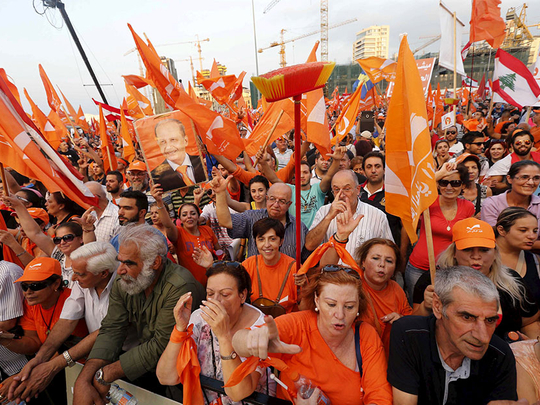
Beirut: On a day when the Progressive Socialist Party leader Walid Jumblatt urged Syrian Druze to revolt against Damascus, a massive demonstration led by the Free Patriotic Movement (FPM), called on the Lebanese to campaign against the government and protest what the party’s non-elected chairman, Jibran Bassil, dubbed the “marginalisation of Christian rights” in the public administration.
Addressing a rally estimated at 25,000 protesters, Foreign Minister Bassil, General Michel Aoun’s son-in-law, renewed FPM demands to regain Christian rights and the alleged loss of partnership in the government’s decision-making process. “We want equality in duties and rights in this state,” asserted Bassil. “We in the FPM will deprive those who deprive us of our rights,” he added.
The passionate presentation included such declarations as: “We want to be equal in the state. We don’t accept that those who pay electricity [bills] and don’t get it, while those who do not pay are getting it and blocking roads.”
Bassil added: “We want a state enjoying 24/24 power supply through renewable energy. We want a state that has water resources, where dam projects are not suspended under the excuse of environmental concerns.”
Since Bassil or other FPM officials held the energy and water ministry portfolios, they allocated over $1.2 billion (Dh4.4 billion) to improve power generation infrastructure in a single year — it was he who promised 24/7 electricity by 2015 — and brought in two Turkish mobile facilities to ensure improvements but couldn’t pull off the desired outcomes.
Irony aside, Bassil touched upon the real purpose of the gathering when he declared: “We do not want the Lebanese to resort to outside [powers] to seek protection” and promised that the FPM would “not accept a [weak] president... or a subservient prime minister”. His soliloquy covered a gamut of issues as Bassil asserted that the party wanted “a state where parliament does not extend its term and violates prerogatives... a state where the judiciary will protect us and where there is security and strength in its army”.
In one of the more evocative statements in his address, Bassil affirmed that the FPM had a dream “to have a strong army, security forces and resistance”, though he did not see the contradiction in his own words. Why would one need a “resistance” when a country fielded a strong army? Moreover, the presentation did not mention Hezbollah, or the 2006 MOU with the party, even if it was clear what he inferred. Observers concluded that the FPM was beholden to Hezbollah with Aoun anxious to use the party to achieve his goal to become head-of-state.
Michel Aoun, who did not attend the rally because he was nursing a cold, spoke briefly to the crowd through a huge screen from his residence in Rabieh. His message was consistent, nevertheless, as he called for a new electoral law based on proportional representation and parliamentary elections to be followed by presidential polls. Although the majority of the political establishment disagreed with his preferences, Aoun maintained that the election of a president by a popular vote was the only way to break the presidential impasse.
Unlike the popular ‘You Stink’ and ‘We Want Accountability’ demonstrations that shook the body politic and mobilsed non-partisan forces in Lebanon, the FPM rally came as its ministers were locked in a dispute with Prime Minister Tammam Salam over the issue of security and military appointments as well as the Cabinet’s decision-making system in the absence of the president.
When ‘You Stink’ protested the government’s failure to resolve an ongoing trash crisis and rampant corruption, it did so in a non-partisan way.
The FPM rally skirted the garbage crisis as it targeted the entire political class and the country’s sectarian-based political system. In Bassil’s own words: “The FPM is gathered today in Martyrs’ Square, but we will soon exhort its supporters to join us in the people’s palace in Baabda.
“The tsunami will return,” he clamoured, because “the future is for us and not for others.”
While supporters carried a few Lebanese standards, most attendees waved the FPM flag. Interestingly, the rally on Saturday attracted a number of Hezbollah supporters, one of whom waved the party’s yellow flag, while a veiled woman carried a picture of Hezbollah leader Hassan Nasrallah. Yet, a key March 8 component was absent, namely the pro-Syria and pro-Aoun Marada Movement led by Sulaiman Franjieh.
Culture Minister Rony Areiji, a Marada official serving in the current Cabinet summed it up best when he said: “this kind of protest in this political period will not lead to the required goal.”
On Friday, the ‘You Stink’ campaign announced that fresh demonstrations at the weekend would drive home the people’s disenchantment with the corrupt establishment. On September 5, two protests were scheduled in Zrarieh in the southern Zahrani area and in the main square of Tyre at 6 pm, followed by four protests on Sunday, two in south Lebanon outside Nabatieh’s Serail at 5:30 pm and in Marjayoun’s main square at 6 pm, one at the Baakline Roundabout at 5 pm, and another in the Bekaa city of Chtaura at 4 pm.











